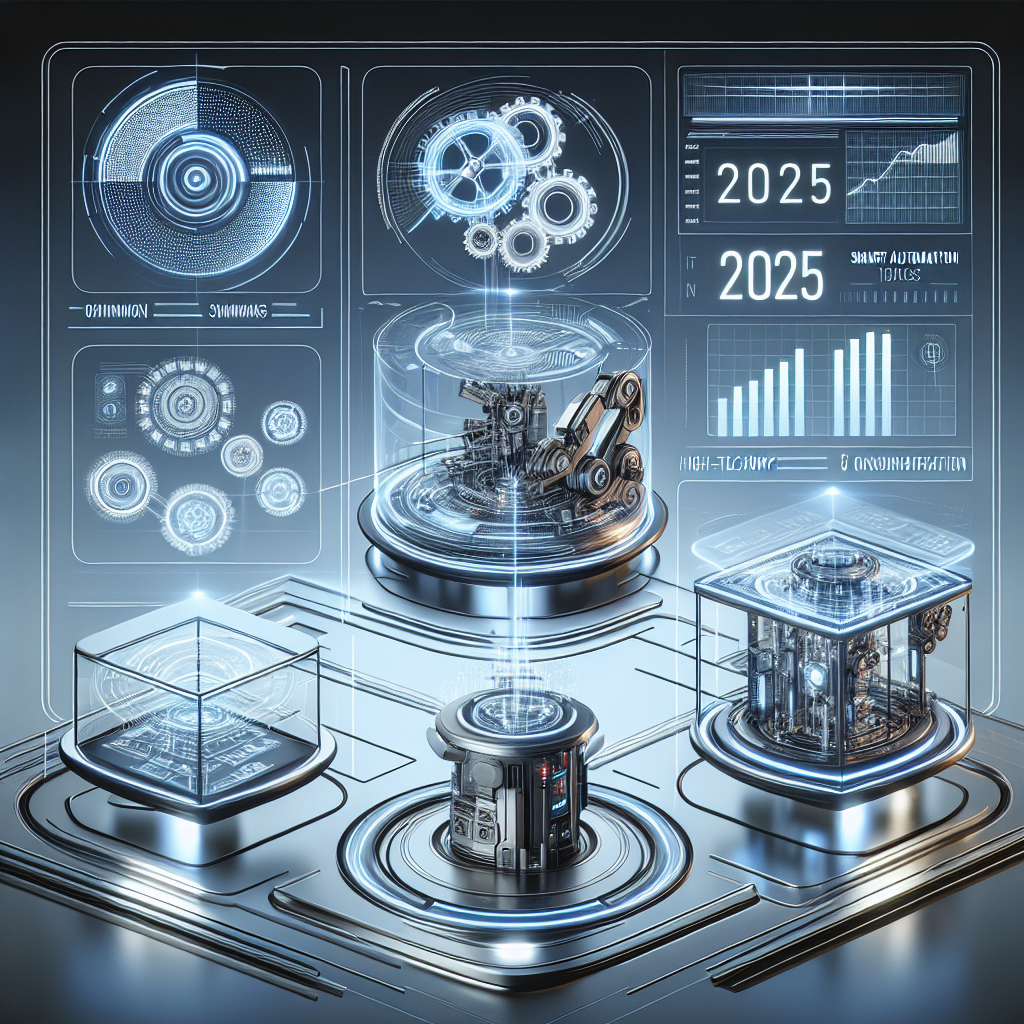5 Ways Intelligent Automation Will Revolutionize Supply Chain Management in 2025
In today’s fast-paced business world, supply chain management is a crucial aspect of any successful company. It involves the coordination and management of all activities involved in the production and delivery of goods and services. With the rise of technology, supply chain management has become more complex and challenging. However, with the emergence of intelligent automation, the future of supply chain management looks promising. In this article, we will explore five ways in which intelligent automation will revolutionize supply chain management in 2025.
Firstly, intelligent automation will greatly improve efficiency in supply chain management. With the use of advanced technologies such as artificial intelligence and machine learning, routine tasks such as inventory management, order processing, and logistics planning can be automated. This will not only save time but also reduce the risk of human error. With intelligent automation, supply chain managers can focus on more strategic tasks, leading to increased productivity and cost savings.
Secondly, intelligent automation will enhance visibility and transparency in the supply chain. With the use of sensors, RFID tags, and other tracking technologies, supply chain managers will have real-time visibility of their inventory and shipments. This will enable them to identify any bottlenecks or delays in the supply chain and take immediate action to resolve them. Moreover, with the use of blockchain technology, supply chain data can be securely stored and shared among all stakeholders, ensuring transparency and trust in the supply chain.
Thirdly, intelligent automation will enable predictive maintenance in the supply chain. With the use of sensors and data analytics, machines and equipment in the supply chain can be monitored in real-time. This will allow for predictive maintenance, where potential issues can be identified and resolved before they cause any disruptions in the supply chain. This will not only reduce downtime but also save costs associated with unexpected breakdowns.
Fourthly, intelligent automation will facilitate better demand forecasting. With the use of data analytics and machine learning, supply chain managers can analyze historical data and market trends to accurately predict demand for their products. This will enable them to optimize inventory levels and avoid overstocking or stockouts. With better demand forecasting, companies can reduce costs associated with excess inventory and lost sales due to stockouts.
Lastly, intelligent automation will improve collaboration and communication in the supply chain. With the use of cloud-based platforms and collaboration tools, all stakeholders in the supply chain can easily communicate and share information in real-time. This will enable better coordination and decision-making, leading to a more efficient and responsive supply chain. Moreover, with the use of chatbots and virtual assistants, supply chain managers can quickly resolve any issues or queries, improving customer satisfaction.
In conclusion, intelligent automation will revolutionize supply chain management in 2025. It will bring about increased efficiency, visibility, predictive maintenance, better demand forecasting, and improved collaboration and communication. However, to fully reap the benefits of intelligent automation, companies must invest in the right technologies and ensure proper integration with their existing systems. With the right approach, intelligent automation has the potential to transform supply chain management and drive business success in the years to come.
Maximizing Efficiency: How Intelligent Automation Can Streamline HR Processes by 2025

In today’s fast-paced business world, efficiency is key to success. Companies are constantly looking for ways to streamline their processes and increase productivity. One way to achieve this is through intelligent automation, which uses advanced technologies such as artificial intelligence and machine learning to automate tasks and processes. In this article, we will explore five HR processes that can be optimized through intelligent automation by 2025.
1. Recruitment and Onboarding
Recruiting and onboarding new employees can be a time-consuming and tedious process. With intelligent automation, companies can streamline this process by using AI-powered tools to screen resumes, schedule interviews, and even conduct initial interviews. This not only saves time but also ensures a more efficient and unbiased recruitment process. Additionally, intelligent automation can be used to automate the onboarding process, from sending out offer letters to setting up new employee accounts and providing necessary training materials.
2. Performance Management
Performance management is an essential aspect of HR, but it can often be a daunting task for managers. With intelligent automation, companies can automate the performance review process by setting up performance metrics and reminders for managers to conduct reviews. This not only saves time but also ensures a fair and consistent evaluation process. Intelligent automation can also provide real-time feedback to employees, allowing them to track their progress and make necessary improvements.
3. Time and Attendance Tracking
Tracking employee time and attendance can be a tedious and error-prone task. With intelligent automation, companies can use biometric technology or facial recognition to accurately track employee time and attendance. This eliminates the need for manual time tracking, reducing the chances of errors and ensuring accurate payroll processing. Additionally, intelligent automation can also be used to automatically calculate overtime and leave balances, making it easier for HR to manage employee schedules and time off requests.
4. Employee Self-Service
Employee self-service is becoming increasingly popular in the workplace, allowing employees to access their personal information and make changes without having to go through HR. With intelligent automation, companies can take this a step further by automating the entire process. Employees can use AI-powered chatbots to get answers to their HR-related questions, update their personal information, and even request time off. This not only saves time for both employees and HR but also empowers employees to take control of their own HR needs.
5. Training and Development
Employee training and development is crucial for the growth and success of any company. However, it can be a time-consuming and costly process. With intelligent automation, companies can use AI-powered tools to identify skill gaps and recommend personalized training programs for employees. This not only saves time but also ensures that employees receive the necessary training to improve their skills and contribute to the company’s growth. Additionally, intelligent automation can also be used to automate the tracking of employee training and development, making it easier for HR to monitor progress and identify areas for improvement.
In conclusion, intelligent automation has the potential to revolutionize HR processes and maximize efficiency in the workplace. By automating tasks and processes, companies can save time, reduce errors, and improve overall productivity. As technology continues to advance, we can expect to see even more HR processes being optimized through intelligent automation by 2025. It is essential for companies to embrace this technology and stay ahead of the curve to remain competitive in the ever-evolving business landscape.
The Future of Customer Service: 5 Processes That Will Be Transformed by Intelligent Automation in 2025
In today’s fast-paced world, businesses are constantly looking for ways to improve efficiency and streamline processes. One of the most promising solutions for achieving this is intelligent automation. This technology, which combines artificial intelligence and automation, has the potential to transform various industries, including customer service. As we look towards the future, it is clear that intelligent automation will play a significant role in shaping the customer service landscape. In this article, we will explore five processes that are likely to be transformed by intelligent automation in 2025.
Firstly, let’s define what we mean by intelligent automation. This technology involves the use of advanced algorithms and machine learning to automate repetitive tasks and make decisions based on data. This means that intelligent automation can handle a wide range of tasks, from simple data entry to complex problem-solving. With this in mind, let’s delve into the processes that will be transformed by intelligent automation in 2025.
The first process that will see a significant transformation is customer support. Currently, customer support is often a time-consuming and frustrating experience for both customers and agents. However, with intelligent automation, this process will become more efficient and seamless. Intelligent chatbots will be able to handle a large volume of customer inquiries, freeing up human agents to focus on more complex issues. These chatbots will be equipped with natural language processing capabilities, allowing them to understand and respond to customer queries in a conversational manner. This will not only improve the speed and accuracy of customer support but also enhance the overall customer experience.
Another process that will be transformed by intelligent automation is data analysis. In today’s data-driven world, businesses are inundated with vast amounts of data. However, making sense of this data and extracting valuable insights can be a daunting task. This is where intelligent automation comes in. With its ability to process and analyze large volumes of data, intelligent automation will enable businesses to make data-driven decisions quickly and accurately. This will not only save time and resources but also lead to more informed and effective decision-making.
The third process that will see a significant transformation is personalization. In the age of digitalization, customers expect a personalized experience from businesses. However, manually personalizing every interaction with a customer can be a daunting and time-consuming task. With intelligent automation, businesses can leverage customer data to create personalized experiences for each customer. This could include personalized product recommendations, targeted marketing campaigns, and tailored customer support. By providing a personalized experience, businesses can build stronger relationships with their customers and improve customer loyalty.
The fourth process that will be transformed by intelligent automation is fraud detection. With the rise of online transactions, fraud has become a significant concern for businesses. Traditional fraud detection methods often rely on manual reviews, which can be time-consuming and prone to human error. Intelligent automation, on the other hand, can analyze vast amounts of data in real-time and identify potential fraudulent activities. This will not only save businesses time and resources but also help prevent financial losses due to fraud.
Lastly, intelligent automation will transform the process of feedback and surveys. Currently, businesses often rely on manual surveys and feedback forms to gather customer insights. However, these methods can be time-consuming and often yield low response rates. With intelligent automation, businesses can gather feedback and insights in real-time through various channels, such as chatbots and social media. This will provide businesses with a more accurate and timely understanding of their customers’ needs and preferences.
In conclusion, intelligent automation has the potential to transform various processes in customer service. From improving customer support to enhancing data analysis and personalization, this technology will play a significant role in shaping the future of customer service. As we look towards 2025, it is clear that businesses that embrace intelligent automation will have a competitive advantage in providing exceptional customer experiences.

Laisser un commentaire